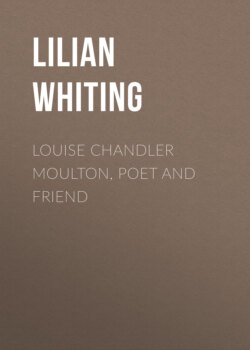Читать книгу Louise Chandler Moulton, Poet and Friend - Lilian Whiting - Страница 4
На сайте Литреса книга снята с продажи.
CHAPTER II
1853-1860
ОглавлениеTable of Contents
| A beautiful and happy girl With step as light as summer air.—Whittier. |
| Her glorious fancies come from far Beneath the silver evening-star, And yet her heart is ever near.—Lowell. |
At dawn of Love, at dawn of Life.—L.C.M.
IN a lyric written by Mrs. Moulton in after years, occurs the lovely line quoted above, which seems vividly to describe her as she stood, a girl of eighteen, on the threshold of a new phase of life.
Young as she was Miss Chandler had already, by her newspaper and magazine work, made for herself a reputation, and she now collected the papers which made up the volume spoken of in the previous chapter, "This, That, and the Other," with the encouraging result of a sale of twenty thousand copies. The North American Review was then almost the only magazine in the country exclusively devoted to criticism and the intellectual life. Much of the best literary work of the time, in the way of fiction and poetry, appeared in such periodicals as Godey's Lady's Book, Peterson's Magazine, and the like; and to these Miss Chandler was a constant contributor. The weekly newspapers were rich in poems by Longfellow, Emerson, Whittier, the Cary sisters, N.P. Willis, Poe, and many others of permanent fame. Besides these, a host of the transient singers of the day, literary meteors, flitted across the firmament, not unfrequently with some song or story which individually was quite as worthy of recognition as were those of their contemporaries whose power to sustain themselves in longer flights and to make good the early promise has earned their title to permanent recognition. Mrs. Moulton's scrapbooks indicate how rich were the literary columns of the newspapers in those days. There being then no international copyright law, the American editor enriched his page with the latest poem of Browning, Tennyson, Swinburne, or Mrs. Browning. Longfellow, Whittier, Holmes, Dr. Parsons, Nora Perry, William Winter, the Stoddards (Richard Henry and Elizabeth), N.P. Willis, Saxe, Mrs. Stowe, Jean Ingelow, Miss Mulock, Aldrich, and Mary Clemmer, are largely represented in these old scrapbooks. Many fugitive poems, too, appear, as the "Bertha" of Anne Whitney, a poem well entitled to literary immortality; the "Three Kisses of Farewell," by Saxe Holm; the "Unseen Spirits," by Willis, a poem too little known; and Mr. Aldrich's "The Unforgiven," excluded from his later editions, but which contains those beautiful lines:
| In the East the rose of morning biddeth fair to blossom soon, But it never, never blossoms in this picture; and the moon Never ceases to be crescent, and the June is always June. |
Miss Chandler's book was one of over four hundred pages, illustrated by the famous Rouse (whose portrait of Emerson has always been so highly considered), and its fine engravings and its binding of crimson cloth combined to give it a sumptuous appearance. The Springfield Republican gave it pleasant recognition in these words:
